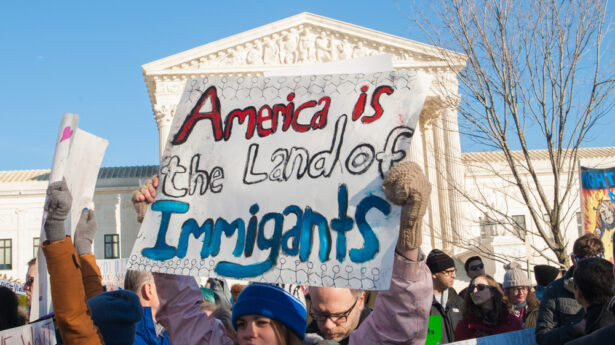The Unitarian Universalist Service Committee advances human rights through grassroots collaborations.
The Bipartisan War on Asylum

By Josh Leach on April 12, 2024
It’s a scene that has become all too familiar over the past eight years: Another week, another incendiary racist comment from former president Donald Trump.
This time, Trump was speaking to a group of wealthy donors at a campaign fundraiser in Palm Beach, Florida. He used the occasion to send yet another obvious hint as to the real reasons for his opposition to immigration. After repeating his usual dehumanizing rhetoric about people seeking asylum, he then asked: “Why can’t we allow people to come in from nice countries?”, before rattling off a list of majority-white European nations as examples: Denmark, Norway, and Switzerland.
The comment was an explicit reference to a controversy from Trump’s first term, when he reportedly bashed the nations of origin of many U.S. immigrants as so-called “s***hole countries.” But whereas that derogatory remark happened behind closed doors—and Trump rushed to deny it—this one occurred out in the open. It is yet another indication, then, of how Trump’s racism has become increasingly blatant and unapologetic over time.
Meanwhile, far from eliciting any pushback from his audience, Trump’s dog-whistle reportedly won approving chuckles from his listeners. The scene is nauseating, but typical. Trump’s glittering array of wealthy donors found it amusing to mock people who have endured hardships they cannot imagine—people whose labor at the bottom rungs of the U.S. economy is the very thing in many cases that made their prosperity possible.
Trump’s remarks, meanwhile, are more than just words. He plans to back them up with extreme actions. Specifically, if he returns to office, Trump is threatening a campaign of mass deportation, which he has himself likened to mid-twentieth century forced expulsions that swept up countless U.S. citizens of Mexican ancestry.
Understandably, these remarks have led many Hispanic Americans to fear they will be the intended targets of Trump’s dragnet, regardless of citizenship status. When the former president contrasts the ancestral countries of U.S. citizens of color with so-called “nice” majority-white nations, while hearkening back to policies that racially profiled Mexican-Americans, it should indeed awaken fears in us all that Trump plans to govern as a blatant white- and Anglo-supremacist.
Yet even as Trump gives yet another glaring sign that a second term in office would be even more xenophobic than the first—and that’s saying something, since the first was the term of family separation and the Muslim Ban—Trump’s political opponents are increasingly borrowing from his same playbook.
In a recent interview with Univision, for instance, President Biden hinted that he was considering an executive order to block asylum at the border, when the number of arrivals crosses a numerical threshold. The next day, the news agency Axios reported that the administration was indeed readying plans for such an order, which could come as soon as the end of April.
Reports first surfaced about such a proposed order in March, shortly before Biden’s State of the Union address. In subsequent weeks, however, the administration appeared to back off from it—mostly because it would almost certainly be blocked in the courts.
In his comments to Univision, however, President Biden seemed to indicate that he might push through the order regardless, ignoring the legal hurdles it would face. As he told the interviewer: “[S]ome have suggested I should just go ahead and try it. And if I get shut down by the court, I get shut down by the court.” In other words, he might do it even though it’s illegal.
The Axios report indicates the authority the President might try to invoke, to do so, is the same that Trump used to enforce his “Muslim Ban.” But this section of the Code has never been interpreted to allow the president to suspend asylum processing. Indeed, when Trump tried to use it this way, during his presidency, the courts struck the policy down, because it flies in the face of U.S. asylum law.
No matter what the courts ultimately decide, however, the morality of the situation is clear: The president should not be trying to block people who are fleeing persecution, or to return them to the hands of the people they fled. Still less should he be invoking the same laws that enabled Trump’s racist “Muslim ban” and “Africa ban” to do so.
Between Trump’s racist rhetoric on the one hand, and Biden’s efforts to suspend asylum on the other, people in migration seem trapped between a rock and a hard place. Genuine friends of asylum-seekers are getting scarce in Washington. And what makes this ugly new bipartisan consensus even more perverse is that it comes at the same time as overwhelming new evidence shows the outstanding benefits that recent immigrants and asylum-seekers bring to U.S. society, regardless of their country of origin.
The time is long past for politicians of all parties to stop catering to the worst in human nature. The truth of the situation is clear: The country as a whole is better off when it welcomes diversity than when it tries to block newcomers from arriving. Politicians need to show the moral courage to make the case for migration. Otherwise, the next few years will be dismal indeed.
Image credit: Shutterstock – Yalcin Sonat

